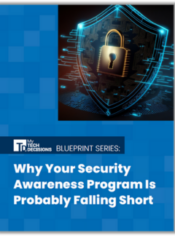TechDecisions spoke with Sam Pemberton, CEO of Impero Software, about the company’s product EdLink, as well as mobile device management, BYOD, and analytics in K-12 education environments.
TD: EdLink is a mobile device management solution that allows for BYOD. How does the product manage students’ personal devices alongside school-owned devices?
SP: Schools with a BYOD initiative in place will usually have an acceptable use policy (AUP) that takes into account the specific scenario of students using their own personal devices. In many of the districts that we work with, a condition of using a personal device in school is that students and/or parents agree to install Impero EdLink and/or Impero Education Pro on the device for monitoring and management purposes, which aligns with the policy for school-owned devices.
The management of these devices (through EdLink) includes an ability to deploy and disable relevant apps remotely, and the real-time monitoring (through Impero Education Pro) gives staff full visibility of student’s screens, when on the school network. This helps to focus students and ensure they are kept on task, in turn improving learning outcomes for the school and the student. It also enhances the internet safety policies within a school to ensure students are behaving responsibly online.
TD: What has the reaction been like from students regarding privacy? Are students or parents wary of allowing the school to access their personal devices?
SP: I think students and parents understand the responsibility schools have to keep young people safe in the current digital climate. We advise schools and districts, with the help of our online safety partners, on how to engage and educate students around online risk. Once they understand this they are able to make better decisions on their own. Monitoring software like Impero Education Pro flags incidents of potentially risky online behavior by students which can prompt these conversations and open up useful dialog around consequences and risk that young people might not have considered. It’s important to note that device monitoring is not about trying to catch a student or get them in trouble; it’s about protecting them and keeping them safe.
Related: Technology Installers Explain Considerations of BYOD
In terms of monitoring personal devices, this is often a prerequisite for students using their own devices under a BYOD program, so it’s up to the student and/or their parents whether they sign up for this. As I’ve already said, once parents and students understand that this is about safeguarding they realize why it is important.
TD: What safety procedures are in place to ensure student devices don’t corrupt a school’s network?
SP: Impero EdLink can limit access to functionality on a student device, specific to the individual requirements of each school environment. For example, by limiting certain types of applications, limiting access to, and the sharing of data, and limiting vulnerabilities at a device level, an additional level of protection is added to the wider school network.
Take VPN technology for example, which was used originally to create a private and secure connection between devices across the internet. It can be misused by students to circumvent firewalls and give access to banned websites. Impero EdLink allows schools to disable these applications ensuring that students remain protected and don’t accidentally download malware into the schools network. This is just one example of how Impero EdLink helps keep networks safe and secure.
TD: How do schools use analytics with Impero Insight?
SP: Impero Insight pulls Impero Education Pro data, from one or multiple servers, and presents it in graphical, interactive reports that allow staff to drill down to the most granular detail. This allows schools and districts to identify trends and patterns of behavior. For example, has there been a rise in students looking at extremist content online, or an increase in terms associated with cyberbullying? Staff can then examine the data in more depth and detail to identify if it’s a particular student, class or year group that are responsible for the trend.
Related: What You Need to Know About Connecting AV to the Network
TD: How can analytics help a school better educate its students?
SP: Once a school has identified these data trends, it can address them in the most appropriate way with students. If there seems to be a general increase in interest around a certain troublesome subject matter (self-harm, eating disorders, racism), the school may wish to hold an assembly on the topic to discuss the issue and offer counter narratives or advice. If activity by a particular student is flagged as a cause for concern, staff may need to schedule time with a counselor. It’s important that schools and districts use this analytical data to educate and mentor young people so as to change behavior.
The schools that we work with report an immediate impact on student welfare, as well as a longer-term reduction in concerning incidents (roughly six months into using this sort of software) as students start to take advice, recognize risks and change their behavior accordingly.
TD: How does Impero help aide student online safety?
SP: As discussed, Impero is all about educating young people to make the right decisions online. By identifying risks early, staff can intervene and mentor young people so that they make better decisions in the future. Impero detects these risks through keyword detection technology, drawing from a comprehensive library of terms and phrases, associated with various types of risk (from sexting to suicide) and developed in partnership with leading experts and charities around the world.
Impero Education Pro monitors the school network and when a keyword is detected, whether it is in an application, an email, on social media, in a search engine, present on a website or in a URL, the incident is captured. This capture is timestamped and logged with a screenshot, or video clip, to provide ‘who, what, where’ style information, putting the incident into context. Staff is then alerted to these captures and are able to deal with issues in real time as they arise.
If you enjoyed this article and want to receive more valuable industry content like this, click here to sign up for our digital newsletters!











That’s a great article, kudos to the article!! BYOD is really important especially for the kids in the school so that the social media sites are banned and they can focus on their studies. I have noticed kids scrolling through Facebook rather than studying in the class.